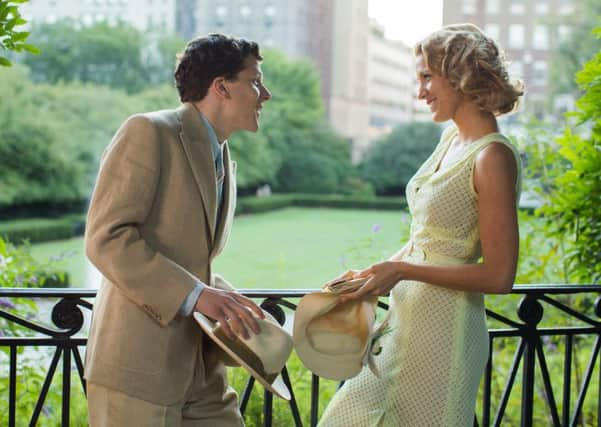Film reviews: Cafe Society | Sausage Party | Brotherhood | Things to Come


Café Society (12A) | Rating: ****
Sausage Party (15) | Rating: ***
Brotherhood (15) | Rating: *
Things To Come (12A) | Rating: ***
Apart from the almost decade-long quality drop-off at the start of the 2000s, Woody Allen’s relentless production cycle means that while the really great films are still few and far between, he can usually be relied upon to deliver the arthouse equivalent of comfort food for grown-up movie-goers.
In this respect, Café Society is a slight delight.
Set against the backdrop of Hollywood and New York in the 1930s, it stars Jesse Eisenberg as Bobby, a Hollywood neophyte newly arrived from New York in the hopes of finding employment with his movie agent uncle, Phil (Steve Carell). Bobby wants to escape his own stultifying – and not entirely legit – family back East and almost immediately loses his heart to Phil’s secretary, the beautiful Vonnie, played with melancholic charm by Kristen Stewart, who’s at last starting to be appreciated for the great actress she’s always been. Vonnie, alas, is already involved, but her love life is complicated, and the persistent Bobby sees a potential future for them back in New York, a future Vonnie is in two minds about pursuing.
Advertisement
Hide AdAllen feeds in lots of other familial subplots too, which allows a great cast of supporting players – including Ken Stott as Bobby’s dad and Corey Stoll as his gangster brother – to add character colour to the gorgeous technicolour lensing deployed by legendary cinematographer Vittorio Storaro. But it’s really Stewart and Eisenberg – channelling Allen without doing a flat-out impression (and synching up nicely with Allen’s own voice-over narration) – who add emotional depth to the film as it turns into a riff on the love-triangle dynamics of Casablanca.
Naturally it’s all very nostalgic – as all Allen’s period films tend to be – but that nostalgia is undercut with a truthfulness that pays off beautifully with a deft and unsentimental ending.
Woody Allen also features – in a manner of speaking – in Sausage Party, albeit in bagel form and with a vocal caricature courtesy of Edward Norton, who starred in Allen’s musical Everyone Says I Love You and here imitates the director’s kvetching mannerisms in order to serve as a profanity laden foil to an Arab-voiced lavash, who despises his Jewish neighbour on the specialist food aisle of a modern American supermarket.
If nothing about that sentence makes much sense, it might clear things up to explain that Sausage Party is also Seth Rogen and writing partner Evan Goldberg’s latest attempt – after bringing the wrath of North Korea to Sony’s door with The Interview – to outrage everyone in their usual we’re-stoned-and-don’t-really-mean-it way, courtesy of a crude, lewd, food-themed riff on Toy Story that basically functions as an animated parable about organised religion. It’s built around the idea that a supermarket hotdog sausage (voiced by Rogen) learns that the promised “Great Beyond” is not some wondrous place where virtuous food will be rewarded for all eternity by us shopper “gods”, but is actually a made-up concept designed to distract the suddenly sentient supermarket food from the fact that when it leaves the shop, a date with death is imminent. Though there are some amusingly offensive ideas here – a shopping cart crash that results in lots of food smashing on the supermarket floor in a cloud of flour has been animated to resemble footage of the 9/11 attacks – the puerility of Rogen and Goldberg’s script (the film was directed by animation specialists Greg Tiernan and Conrad Vernon) is only intermittently funny and the meditations on faith and theology haven’t been developed with enough sophistication to give this the satirical bite of Matt Stone and Trey Parker’s Team America: World Police or their brilliant stage musical The Book of Mormon.
Still, rather this than Brotherhood, the third film in Noel Clarke’s rubbish trilogy of London street movies that began with the inexplicably successful Kidulthood and continued with the duff Adulthood. If you’re not up to speed on those films, this one begins with a brief montage of clips sketching out the fate of Clarke’s character, Sam Peel, a former hoodie-wearing thug who’s done time for manslaughter, but is now trying to go straight with a lawyer wife and two kids. It’s not long before he’s reluctantly drawn back into his old life, however, as figures from his past inevitably want payback for past misdeeds. The plot that ensues is boilerplate gangster movie nonsense, rendered unintentionally laughable by ludicrous contrivances and Clarke’s inability to convey any sense of menace as either an actor or a director.
Things to Come is the latest from acclaimed French director Mia Hansen-Løve (Father of My Children, Eden) and feels very much like a response to real-life partner Olivier Assayas’s excellent 2012 film Something in the Air. Where that was a period film about the revolutionary spirit of May 1968, as seen from the perspective of a group of students in the early 1970s who had just missed this revolutionary moment, Hansen-Løve’s film takes place in the present day and focuses on a female academic in late middle-age (played by Isabelle Huppert) who still sympathises with some of the revolutionary ideas of that era, but only as an academic pursuit, not as a lifestyle choice.
Advertisement
Hide AdWhen her marriage suddenly disintegrates, however, her new-found freedom forces her to confront her purpose in life, particularly as she grows closer to her protégé Fabien (Roman Kolinka), who believes in putting into practice the philosophical ideas he studies. All of which is almost as annoyingly pretentious as it sounds, but it’s also saved somewhat by Huppert’s prickly performance.